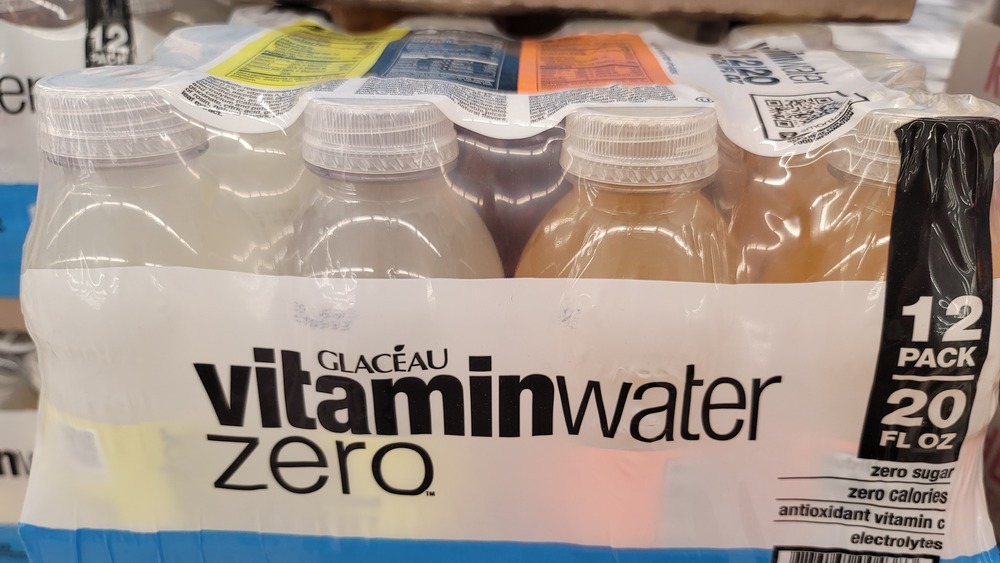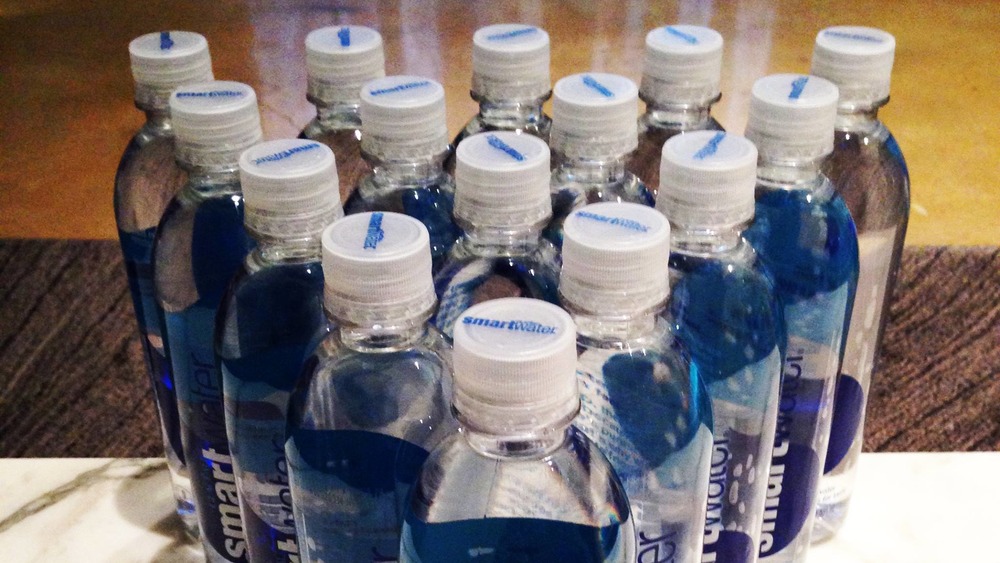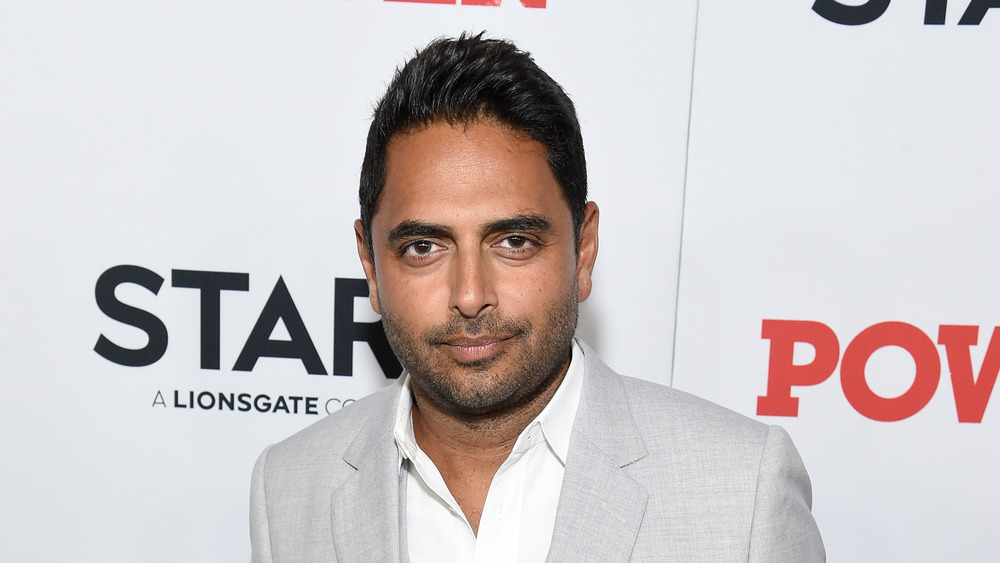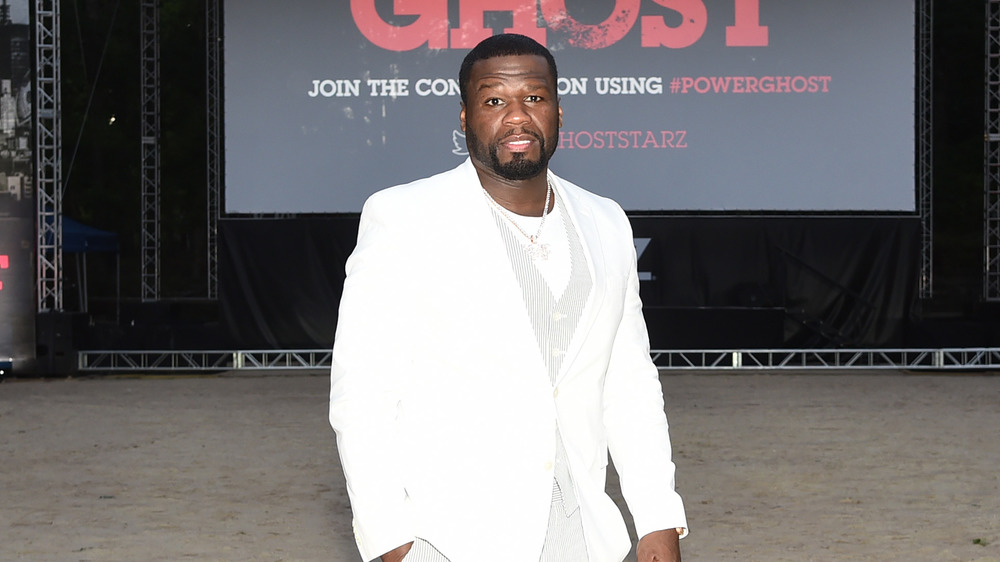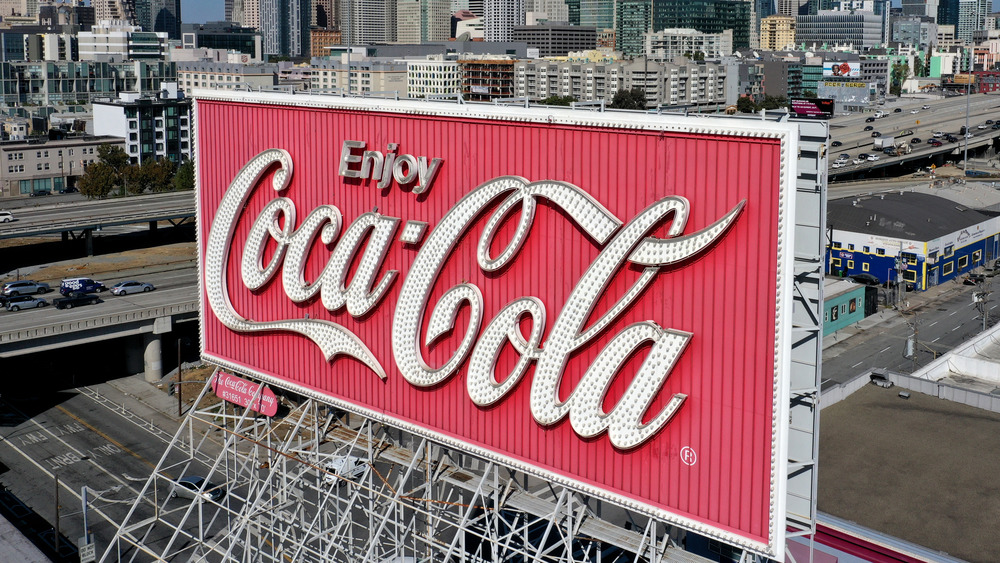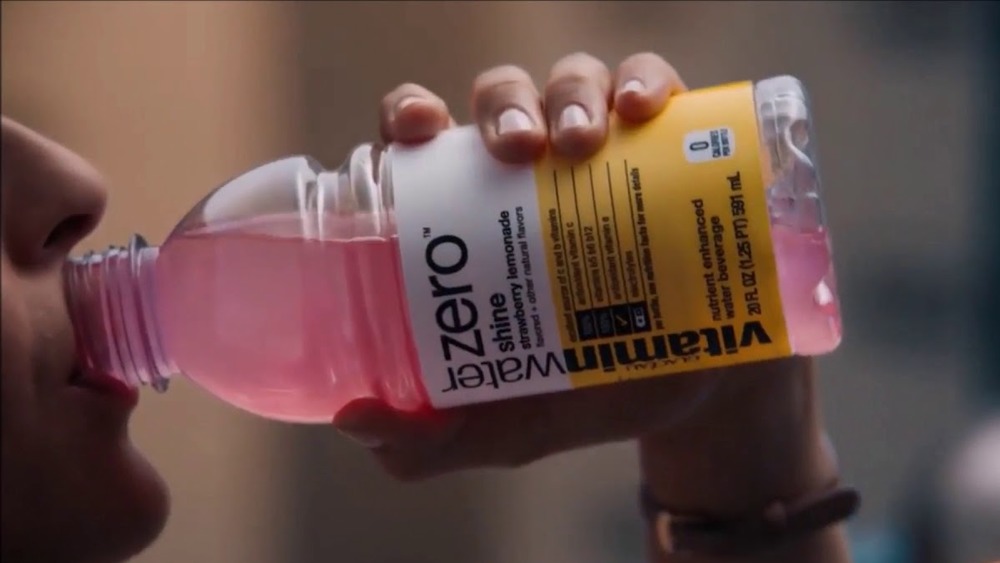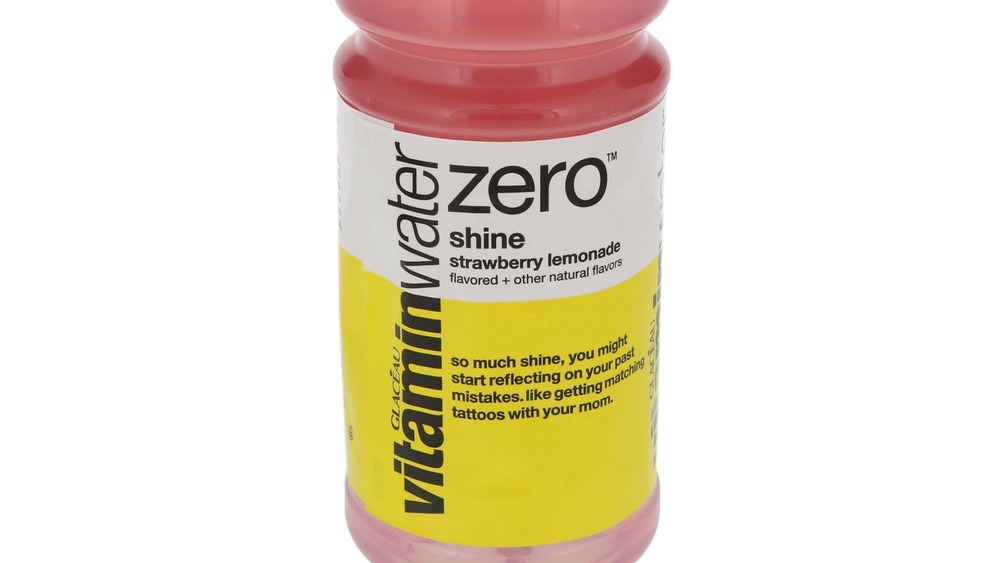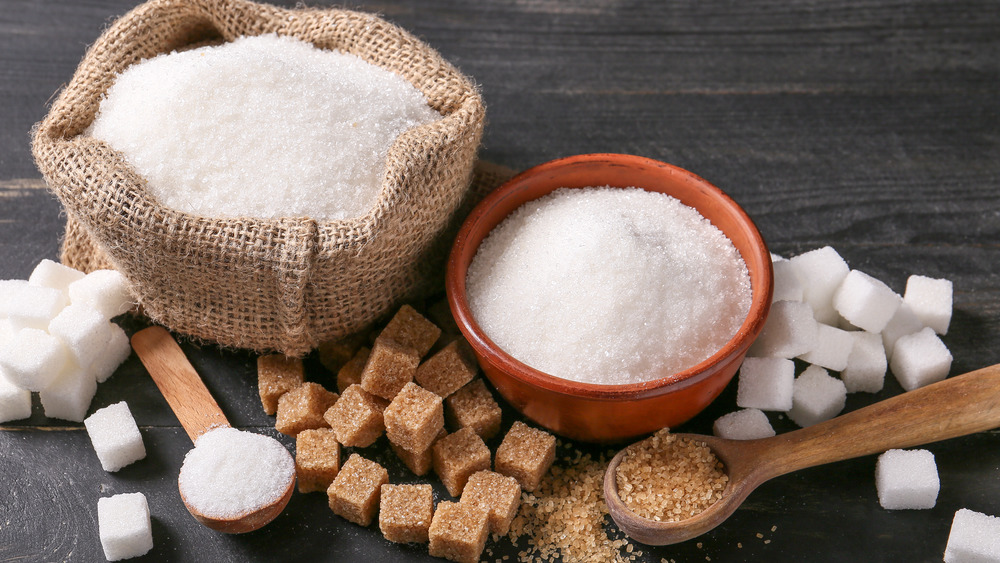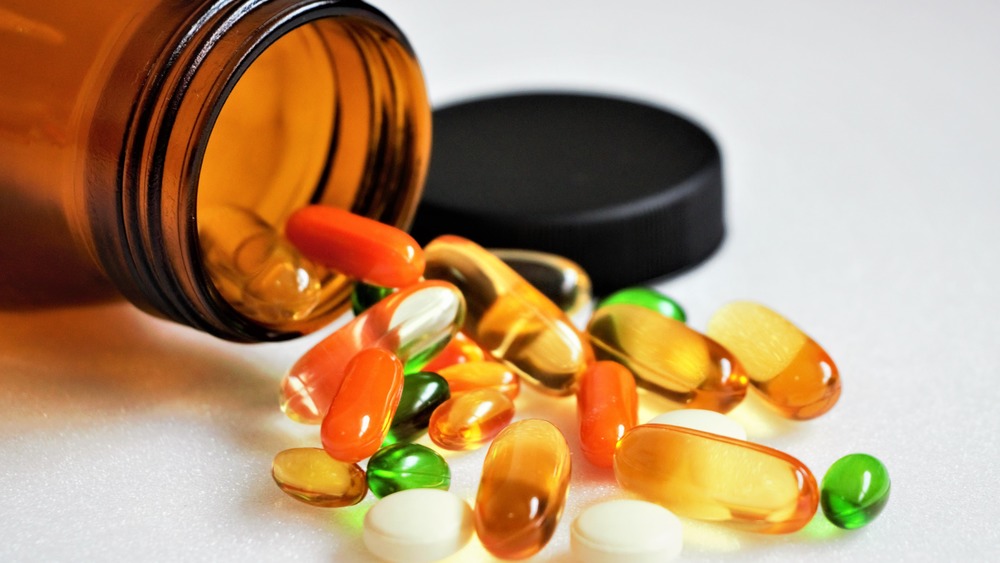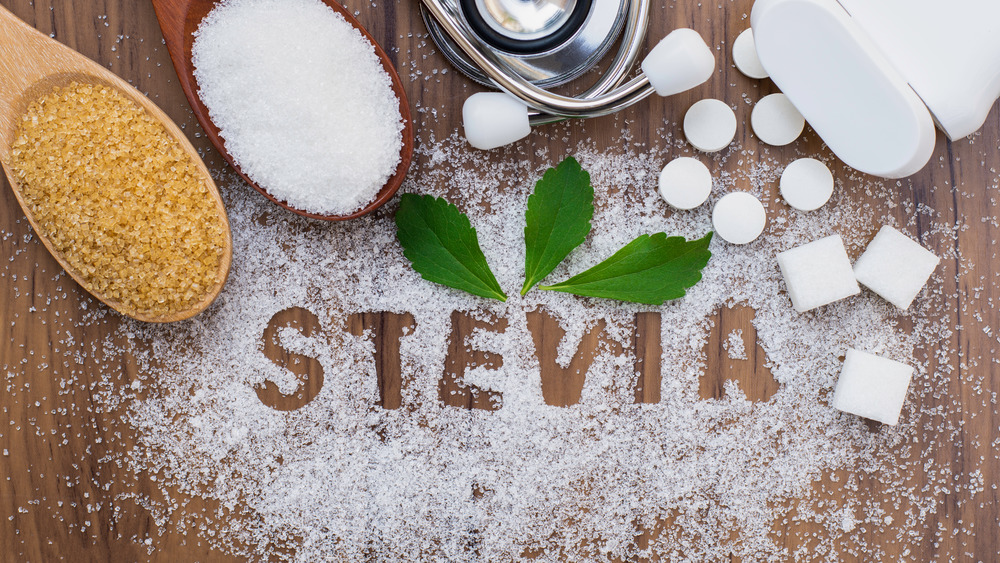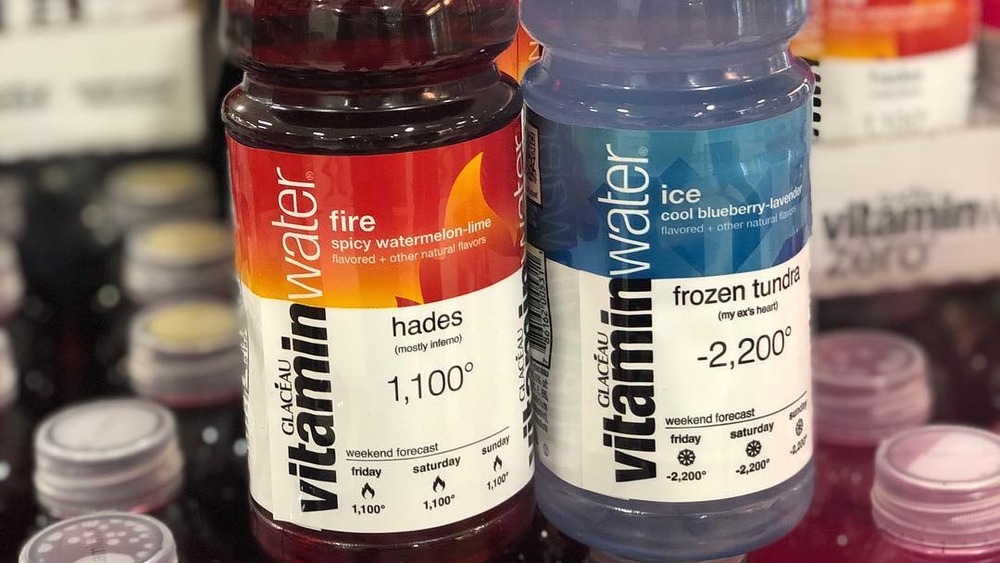The Untold Truth Of Vitaminwater
Picture the scene. It's a scorching 90 degrees outside. You went for your daily run, but today, you gave it your all. The workout ends with you drenched in sweat and in desperate need to satisfy your thirst. You're not going to reach for just plain ole h20, are you? Well, until the early 1990s, you'd likely be doing just that. Ahhhh, the pre-enhanced water era.
There are only a few things humans need to survive, with water being one of those. It doesn't take a rocket scientist to realize the lucrative potential with water and exploring ways to expand upon that basic element. It did, however, take a health nut, with a knack for entrepreneurial tendencies to open up the floodgates (pun intended) to enhanced water. Amidst the highly competitive beverage industry, one product has outshined the rest in consumption: vitaminwater. Yes, the "v" is lowercased. Launched in 2000, the water that is enriched with vitamins and minerals has taken the beverage industry by storm, earning millions each year. Let's take a look at the untold truth of vitaminwater.
The story of vitaminwater first began with smartwater
Before we can even scratch the surface of vitaminwater, we must look at its predecessor, smartwater (also lower cased), and its creator, J. Darius Bikoff. Bikoff was a health nut with a big dream. It was he, himself, who peddled his brand new electrolyte enhanced line of water, called smartwater, to independent grocers and health-focused stores around his home of New York. Bikoff's smartwater was the first in his lineup of enhanced waters under the brand name, Energy Brands. The smartwater beverage quickly took off and led to the development of fruitwater, and then vitaminwater in 2000.
With demand came expansion, and by the early 2000s the company found national distribution. The company began operating under the name Glaceau, and by 2002 it became the top selling enhanced water within in the States. It quickly caught on overseas as well, and in the latter half of the Y2Ks, it reached global status. Overseas success could largely be credited to the company's sale to the Coca-Cola company, but more on that later. With a revenue of $300 million annually in 2006, vitaminwater proved to be the biggest moneymaker in the lineup.
Rohan Oza is the brand master behind vitaminwater's success
It could be proclaimed that much of any product's success could be attributed to the geniuses behind the curtain. There's an old saying: you can lead a horse to water, but you can't make him drink. So how do you get the folks to drink? Marketing, baby. This is where Rohan Oza, dubbed the "Brandfather" of Hollywood, comes into play with his unprecedented brand building skills. He both metaphorically and physically got the people to drink the water. Oza is credited with linking the biggest A-listers in the world with brands, creating fruitful partnerships that benefit both parties, and particularly, boost celebrities' own personal brands.
Oza, who was then vitaminwater's head of marketing, enlisted sports greats, David Ortiz of the Boston Red Sox and Brian Urlacher of the Chicago Bears for the playful (and impactful) "vitaminwater, Try it!" campaign. It was the company's first stab at televised marketing, and Oza's key to getting big name celebs to stick their necks out for a brand was by making them equity players in the deal. He later added Kobe Bryant, LeBron James, Kelly Clarkson, and as we all now know, rapper 50 cent, into the mix. Oza's marketing approach is less about focusing on one specific sector — like Gatorade for athletes — and rather about making the beverages appealing to all ages and demographics.
50 Cent was a fan before he become an official vitaminwater spokesperson
Rapper 50 Cent may have landed in financial ruin, but there was a time when he was the best in his game. The New York-born rapper caught attention for his off-brand passion in the mid-2000s, and he really loved vitaminwater. When he wasn't "In Da Club," he featured the drink in music videos and even in song lyrics, all on his own accord. Glaceau quickly caught wind of their adoring fan and music giant, and offered him a minority stake in the product in 2004.
As part of his partnership, he was featured in ad campaigns, including national television spots, and even developed his own flavor, the grape-flavored Formula 50. Unlike so many celebrity endorsements where the celeb's name is merely attached to the product, 50 Cent was heavily involved in the creative process, as opposed to leaving it up to the execs. According to the Forbes List of the "World's Most Powerful Celebrities," 50 Cent's, stake in the company made him a hefty profit when Glaceau was purchased by Coca-Cola in a multi-billion dollar sale. That's some major dough, all thanks to him randomly stumbling across the product at a Los Angeles gym.
Sales skyrocketed after Coca-Cola purchased Glaceau's vitaminwater in 2007
In an attempt to find success beyond the fizz, the Coca-Cola company broke into the non-carbonated biz in 2007 with the acquisition of Glaceau, and as part of that deal, acquiring vitaminwater. Thanks to the commercial success the product was having with the younger demographic — in part due to their unique marketing campaigns — the Coca-Cola company paid a reported high price tag of $4.1 billion. At that time, Glaceau was estimated at only roughly $2 billion. This caused many to turn heads, but Coca-Cola saw potential in the investment and future of the products. This acquisition sent the media into a frenzy and made the deal a major headline.
According to Reuters, the Coca-Cola company, up to that time, had been way behind Pepsi in the non-carbonated sector, who at that time was successfully hawking Propel Fitness Water. The founder, Bikoff, stayed on board as Glaceau was operated as a separate business entity within the Coca-Cola company. According to Investopedia, after the acquisition, the annual sales of vitaminwater soared from $350 million to over $1 billion. Coca-Cola could also be largely credited for the product's success overseas, further fueling vitaminwater's large scale presence in the beverage industry.
Marketing campaigns for vitaminwater lean towards the non-traditional
If it ain't broke, don't fix it ... right? While traditional marketing schemes have been known to oil the wheels on taking brands the distance, vitaminwater is wildly successful for a reason. At times somewhat irrelevant at first glance, the company has opted to think outside the box when design and launching campaigns. One such television campaign found former American Idol winner, Kelly Clarkson, sipping on the beverage while appearing on a European talk show. The host goes on to explain that drinking vitaminwater can improve concentration and focus. A totally irrelevant or a blatant attempt to appeal to all? Rohan Oza explained: "There's no age group. It's 8 to 80. it's just anyone looking for a healthy drink." We all drink water, so why ignore any one particular group?
While television has been a large medium for vitaminwater, they took to the internet with another successful campaign. As a tie-in to Coca-Cola's sponsorship of the London 2012 Olympics, they launched the 'Skip The Dip' campaign across Spotify, Facebook, and YouTube. Resting on their claims that the product helps improve concentration, consumers were able to create their own newsreel depicting their own experiences with daily energy dips and were rewarded with free product and prizes.
Health claims have landed vitaminwater in legal trouble
We've seen the product's ties to award-winning sports figures and A-list talents with claims that it will improve one's focus and concentration, but where's the science behind this? Vitaminwater was in some pretty hot water (pun intended) when it was taken over by the Coca-Cola company. According to Reuters, vitaminwater had been in litigations for over six years because of supposed claims that they overstated the product's health benefits.
While the issue was resolved with no owed damages to the consumer, it did set back Coca-Cola a nearly $3 million in costs to cover legal fees and expenses. As part of the very public settlement, Coca-Cola was required to make changes to the labels by more prominently displaying the nutritional information and add the phrase "with sweeteners" to the bottle in two different spots. They were also banned from making claims that drinking vitaminwater would reduce the risk of certain diseases and that drinking it may improve immune functions.
Vitaminwater uses vague, yet legally accepted, language in their marketing
The terms "cage-free," "organic," and "all-natural" are thrown around so often these days it's no wonder that it's near impossible for the consumer to determine what is actually healthy for them. Between conflicting experts and bogus claims, are these enhanced products actually good for us or just another company's feeble attempt to squeeze more money out of our prying hands? According to a report from Mintel, the bottle water industry racked in $15 billion in 2015 alone, with the most cha-ching coming from enhanced bottled water products.
Consumers are drawn to these buzzy terms with the hopes of putting something good into our bodies. Electrolytes, vitamins, and minerals are certainly beneficial for our bodies and these implied promises found on labels have us running to the shelves chasing that underlying dream of overall sound body, health, and mind. According to TIME, these vague uses of language are totally legal for companies to freely use thanks to the Food and Drug Administration (FDA) regulations, even if they are a bit deceptive to the average consumer and nothing more than marketing smoke and mirrors. While they have had to cut back on health claims in their advertising campaigns, they can use words, like "focus" and "energy," on their labels since the FDA only regulates claims, not the use of individual words.
There's probably more sugar in vitaminwater than you realize
It's evident that the success of vitaminwater could be highly attributed to its health claims coupled with their overall genius level marketing campaigns. Why reach for a fountain soda when you can take in the bounty of health benefits promised by enhanced water products? While vitaminwater does contain minerals and vitamins, it also contains a boatload of added sugar. Yep. Added, not natural sugar. The particular type of sugar they use, fructose, is linked to a laundry list of health issues and may outweigh any potential health benefits you'd receive from the added vitamins.
The types of sugar used in the drink varies throughout the countries (that's why a Mexican Coke taste different than the American version) it is distributed in, but in the U.S., a single 20-ounce bottle contains about 120 calories and 32 grams of sugar. While 32 grams is about 50 percent of what's found in the standard bottle of Coca-Cola, the fructose amounts are about the same. According to the American Heart Association, men should consume no more than 36 grams of sugar a day, while women should limit it to only 25 grams per day.
Is there a benefit to drinking your vitamins? Not really
The idea behind vitaminwater leans heavily on the assumption that with consumption comes along a fueling of the body through vitamins and minerals. While studies vary, according to Harvard's Health Watch, recent studies have shown that there's no added health benefit to vitamins in non-traditional forms, be it liquid, pill, or powder. Furthermore, these products can't hold a candle to a diet that is rich and well-balanced in real fruit and vegetables.
The public availability of these studies hasn't done much to slow down the health-focused vitamin industry. Consumers are still continuing to purchase multi-vitamins and related products in record numbers. According to The Hill, the dietary supplement business is a big one in the United States bringing in a whopping $40 billion annually. The industry is so large, in fact, that it's proven difficult for the U.S. Food and Drug Administration to regulate and shed any true light on the many health benefits claimed by these companies. Skepticism aside, it's beginning to become clear that we should maybe grab that banana, full of only natural sugars, after our workout.
Fans flipped when vitaminwater switched from sugar to Stevia
So, it's clear there's kinda, a lotta, buncha sugar in vitaminwater. Even with the potentially massive blows to the health system associated with the consumption of sugar in excessive amounts, that didn't stop fans from quite literally flipping out when the Coca-Cola company made the switch from all added sugar to incorporating the plant-derived Stevia in 2014. The main issue here was the use of the natural, no-calorie sweetener dramatically altered the taste of the drink fans knew and loved. It also didn't offer much change in the nutritional label, as it did not alter the calorie content and only slightly lowered the total grams of sugar.
Fans took to vitaminwater's Facebook page to berate the company over the switch. They cried out that the product tasted artificial and left a chemical taste in their mouth. The Coca-Cola company quickly took notice of the uproar and reverted back to their original sweetening method. For those on a low-sugar diet, they still distribute a Zero line that has no added sugar and utilizes stevia in its place.
Experimental vitaminwater flavors have become more frequent
At the end of the day, it's not all about marketing and nutritional benefits (or lack thereof), sometimes we want to satisfy our taste buds and quench that lingering thirst with something that's full of flavor. Otherwise, we'd be grabbing that plain glass of water. Since its launch in the early 2000s, vitaminwater has continued to keep the consumer engaged by expanding their portfolio of flavors. There's everything from run of the mill, approachable flavors, like iced tea, to limited time options, and unique fruit-forward blends, like kiwi-strawberry.
Recent unique flavors include the 2019 launch of vitaminwater fire and vitaminwater ice. Fire features a spicy watermelon lime taste and utilizes hints of jalapeno to create a tingling sensation on the tongue. On the contrary, Ice creates a cooling effect with flavors of blueberry and lavender. They both also happen to be a part of the brand's 20 calorie line. Of course, with the new flavors launch came a unique marketing campaign complete with a sweepstakes to win a trip to the wintery tundra of Iceland.
